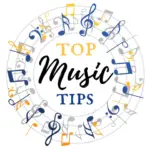Band Camp is a fun and exciting time during the summer for many music students. It can also be stressful and nerve-wracking if you aren’t sure what to expect.
While Top Music Tips doesn’t host any band camps (at least not yet). Our team of writers all have a lot of experience attending them.
This article will be your guide to help you know what a typical band camp schedule might look like and what to expect before attending one.
We will discuss a lot of different types of band camps. Because every band camp you attend will be different and not all camps divide their time equally we will touch on a few of the most popular ones.
Here you can find examples of what your typical band camp schedule day may look like as:
- A middle school student at an overnight band camp
- A high school student at an overnight camp,
- Music day camps (no marching)
- Overnight marching leadership/ marching band camp
- Marching band preseason training at your school
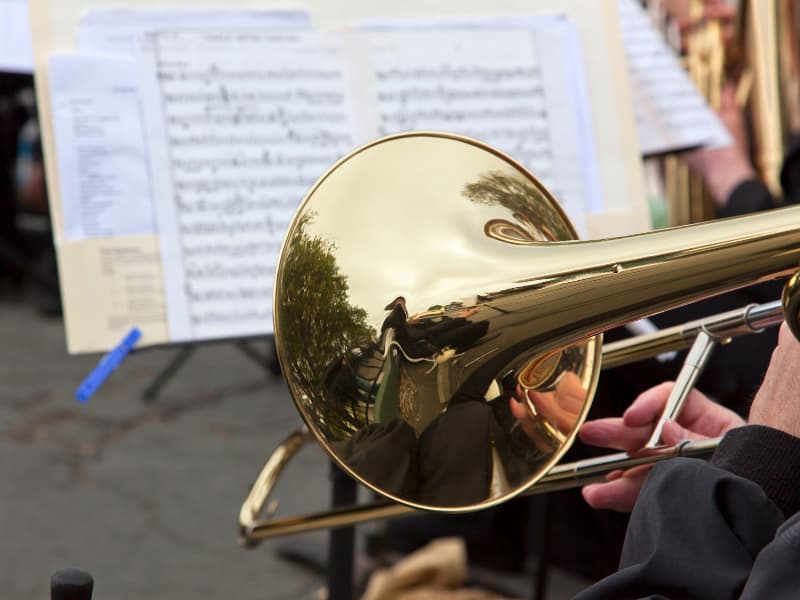
How long is band camp?
The typical length for different types of band camps are:
- Middle school camps are typically one week long.
- High school overnight camps can be anywhere from two weeks to several months.
- Marching band camp will be at the high school you will be going to/ currently attending and is typically a week to 5 days.
Some marching bands may have two camps; it depends on the size, difficulty of music and drill, and whatever the director wants to do.
🎵 Note: This article is part of our Band Camp Series where you can learn all about how to prepare for camp and what to expect. You can check out these other articles in this series as well.
Band Camp Essentials (The Ultimate Packing List for Band Camp!)
Overnight Band Camps (Example Schedule)
Middle School Overnight Band Camp
If you are attending an overnight band camp while you are a middle school student, you are most likely only going to be staying at the camp for a week to nine days (all camps are different, but a majority are a week long). Your typical band camp schedule will typically look as follows:
Breakfast: 6:45 – 7:45 AM
Most overnight camps have a cafeteria or a dining room/ hall in the dorms you will be staying in. This makes it easy to get out of bed and head downstairs for breakfast.
You can either bring all the things you need for rehearsal to breakfast or pop back up to your room and grab your stuff before you leave the dorm.
The breakfast you will have is the same as a continental breakfast that hotels offer. If you do not eat breakfast, consider having some fruit or something to hold you over until lunchtime.
Full Band Rehearsal: 8:00 – 10:30 AM
After breakfast, the counselors will lead everyone to the college of music, different theaters, or one room for the first full band rehearsal of the day.
This rehearsal is like band class back in school, warm-up, scales or tuning exercises, and practicing new pieces of music. The conductor will likely divide the music in half so you can work on one to three different pieces during this first rehearsal.
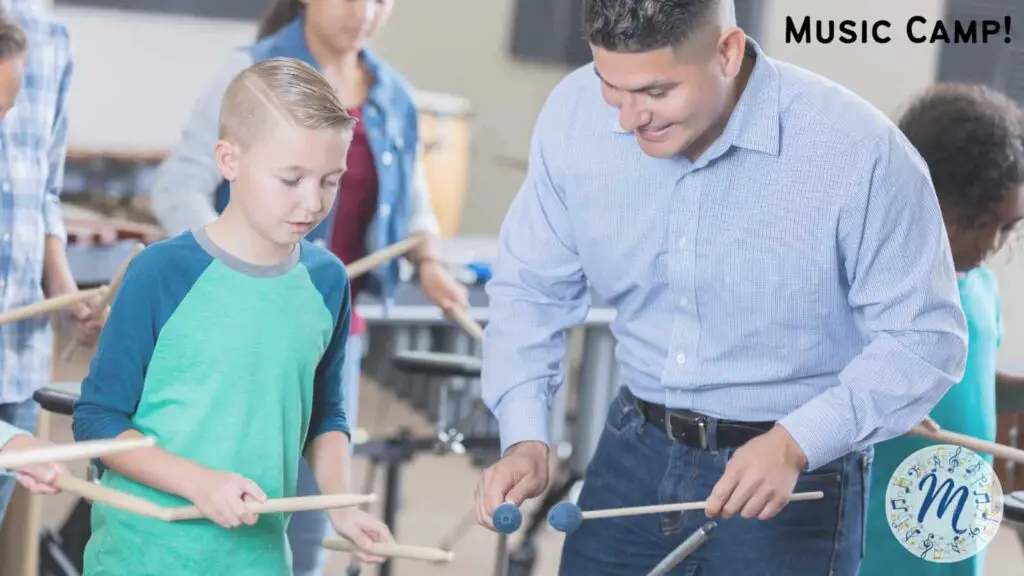
Sectionals: 10:40 – 11:30 AM
All of your sections will be sent to a different classroom or location near the band room to work on your music as a single section.
There will be a teacher there who plays the same instrument as you, and they will have everyone take a seat in an arch shape. Then you will work on the music you just played in full band rehearsal, and the teacher will make sure the entire section sounds like one musician and not 30 different musicians.
🎵 Note: Your sectional teacher may stand in the back of the full band rehearsal and take notes on things they want to work on with you as a section.
Lunch: 11:50 AM – 1:00 PM
Your lunch break is scheduled with enough time for everyone to return to the dorm or a dining hall where you ate breakfast.
Tip: There are a lot of campers, so be patient while waiting in line.
Typical lunches include options for hot food, sandwiches, a salad bar, and a dessert. The options mean you can still find something to eat if you have food allergies or follow a special diet.
Feel free to ask the staff serving you if you require a separate/specific meal (if you keep Kosher or have severe food allergies). Your camp will let them know if someone needs a different meal, and they will make them in advance to pass out as you move through the lunch line.

Full Band Rehearsal: 1:30 – 2:50 PM
Once again, you will return to the room you were in at the start of the day for another full band rehearsal. You will work on the other pieces of music that you will play in a concert at the end of camp for parents and friends.
Elective: 3:10 – 4:00 PM
Most middle school overnight band camps will offer an elective you will select when you register for camp or when you check in/audition. Some classes that may be offered as an elective may be piano, percussion (steel drums are very popular at many camps), or music theory.
Tip: Pick an elective that sounds like the most fun, and don’t worry if your roommate or friend at camp is doing a different elective; you become friends with people in each class of the day.
Masterclass: 4:10 – 5:00 PM
If this is the first time you have been in a masterclass, it is a class led by a master or expert musician who can give you tips and help the section grow stronger as a musician.
They will be a professor of music, a band director from another school, or a college student working on their doctorate degree in music who will lead the class in a more advanced sectional.
You may be given new music just for playing in your masterclass, or you will learn advanced playing techniques (double tongue, circular breathing, multiphonics, etc.).
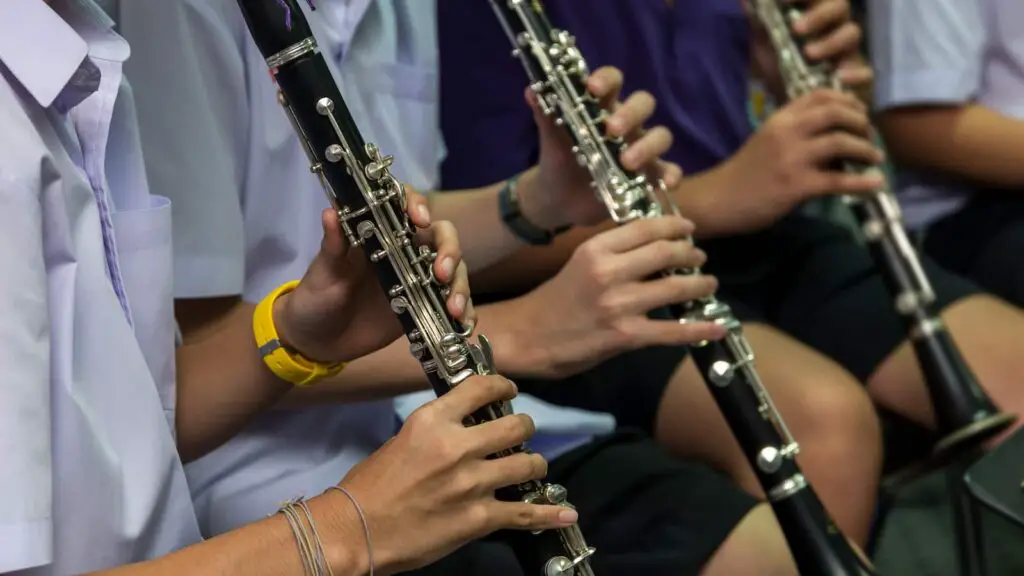
Dinner: 5:00 – 7:30 PM
You have finished a day packed full of rehearsals and classes! You will return to your dorm/bunk and have dinner in the dining hall, just like you did for breakfast and lunch. If you want to shower before the rest of the activities, do that first, and then come down to get food.
Evening Activities: 7:30 – 9:30 or 10:00 PM
After dinner, many middle school overnight band camps offer an activity to do before bed. These activities include seeing a movie, going bowling (if the campus has a bowling alley), or attending a variety show where the counselors perform for you.
🎵 Note: If the activity doesn’t interest you, a group of campers will return to the rehearsal space or college of music to practice.
If your camp is at a college, there will be lots of practice rooms available in the building, and you can work on practicing anything you want.
If a camp does not have evening activities where you are going somewhere, this time is for socializing and getting to know your fellow campers. Some counselors will give you craft supplies to decorate your nametag on the door to your room; it may even be a contest your counselor judges at the end of the week. It is your time to relax and have fun.
Lights Out: 10:00 PM
At 10 PM, it is time to go to bed, and everyone returns to their rooms or bunks with their roommates to shower and get a good night’s sleep. Your counselors will come by to check to make sure the main lights are turned off, and the room is quiet.
That is what a typical schedule may look like for a middle school overnight band camp.
Again, the specific times and activities may be different at the camp you attend. This schedule is just an example of the structure of what the week may look like while at camp.
High School Overnight Band Camp
The daily schedule for an overnight camp for high school students will usually look similar to that of a middle school overnight camp schedule, but the times you spend in each rehearsal or class are different.
It is common for a high school overnight band camp to be between two weeks long or for the entire summer (2-3 months), depending on the camp you attend.
You may have your weekends free to relax and hang out with friends. Camps often have a list of different activities for the weekend that you can sign up for and attend. Here is a typical schedule for a High School Overnight Band Camp may look like.
Breakfast: 6:45 – 7:45 AM
Sectionals: 8:00 – 9:00 AM
First Full Band Rehearsal: 9:10 – 11:30 AM
Lunch: 11:50 AM – 1:10 PM
Second Full Band Rehearsal: 1:20 – 3:00 PM
Elective: 3:10 – 4:00 PM
Like electives in a middle school overnight band camp, you can select from various electives such as music theory, learning a new instrument, ethnomusicology (the study of music in different cultures), steel pan, or piano.
Master Class: 4:10 – 5:00 PM
Dinner: 5:00-7:00 PM
Evening Activity: 7:00 -?
If you are attending an overnight camp at a college or university, an evening activity may be something like going to the on-campus bowling alley, a pottery studio, or going to the college of music to practice in a practice room.
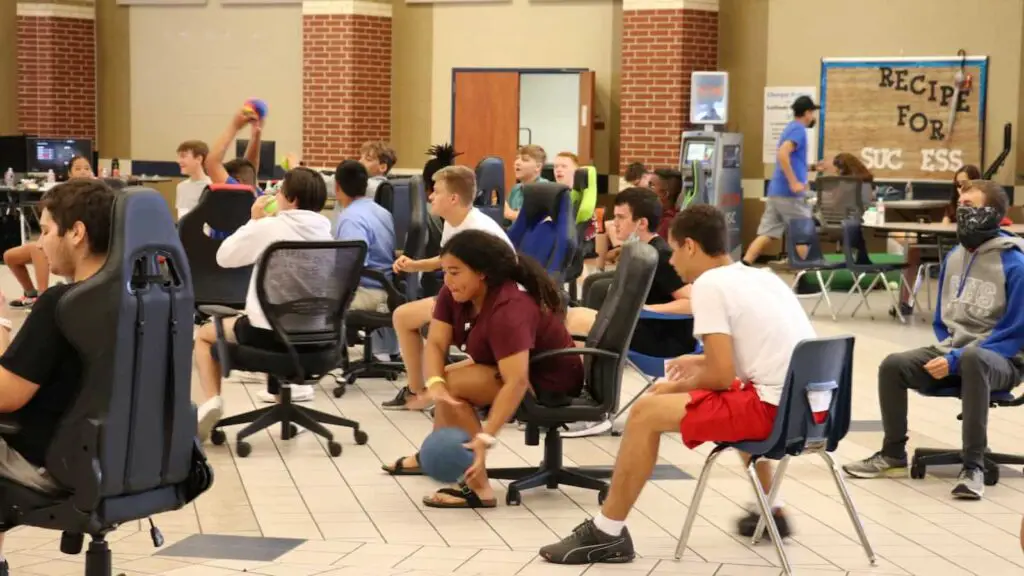
Overnight Marching Band Leadership Camps
If you are attending a marching band leadership camp, you will be:
- Marching
- Learning different marching techniques
- Practice at giving commands to a small group of other campers
- How to teach someone how to march,
- and other leadership lecture.
These are designed for Drum Majors, but you do not have to be one to attend most of these camps.
Drill Captains, Woodwind/Brass Section Leader, Captains/Co-Captians, or any other leadership roles used at your school.
Many overnight marching band leadership camps are held on college and university campuses. You will march on the school’s practice field and work with music professors and notable marching band alums.
Former Drum Majors, School Directors, and Director of Athletic Bands are some of the people you will work with at these camps.
Not all overnight marching leadership camps are the same, but this is an example of a typical schedule.
Breakfast: 7:30 – 8:15 AM
You will be outside for several hours and sweating profusely. Fainting, heat stroke, sunburns, and sun poisoning are some of the risks in marching band, and having food in your stomach, and drinking water will keep you fueled and less likely to faint.
Tip: It is essential to eat breakfast, hydrate, and avoid milk during breakfast at these camps.
Leadership Training: 8:30 – 10:00 AM
This will vary depending on the camp you attend, but things like establishing authority, being a good leader, what freshman will be worried about or have trouble with and how to fix it.
There also may be small informal lectures on topics like being a female Drum Major and the challenges you will face in the role, from respect to selecting a suitable uniform.
15 Minute Break: 10:00 – 10:15 AM
Squad Fundamentals and Demonstration: 10:15 – 11:45 AM
This is the time when you are outside and on the field marching. Here is when you will learn marching techniques and how to teach someone to march. It is common to break people up into smaller groups to establish a squad.
A typical exercise is for each group member to step forward and teach the rest of the group an exercise, marching commands, or other marching-related things.
This lets you practice giving commands clearly, and you will learn techniques that other school’s marching bands do. Camp staff will have everyone stand in a block and give commands that the entire group must execute.
Lunch: 11:45 AM – 1 PM
The lunch break is longer than usual, so campers have time to eat and shower in their dorm room/bunk. You won’t be going back outside, and most campers want to cool down, clean themselves, and change into clean clothes.
Conducting Techniques: 1:00 – 2:15 PM
During this part of your day, you will learn how to conduct music and learn how to conduct in 4/4, 3/ 4, and 2/4 time signatures.
Staff will lead you on how to conduct with one hand, give cues, and conduct properly. The camp may ask you to pack a conducting baton. Your conducting technique lessons also include conducting with a baton.
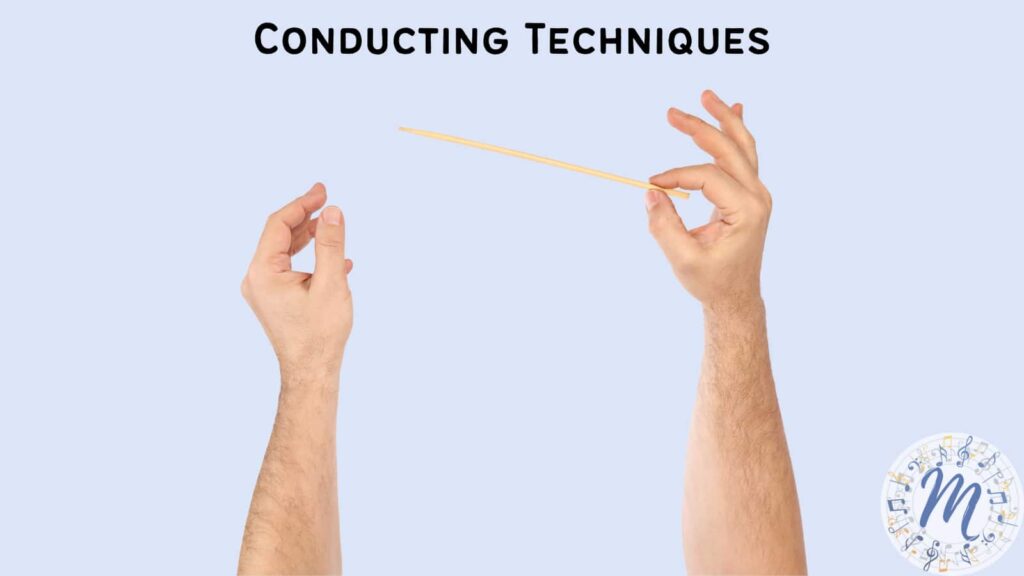
Break: 2:15 – 2:30 PM
This break for your arms, conducting takes more arm strength than it looks.
Small Groups: 2:30 – 4:00 PM
In the small groups part of the day, you and other campers will learn things like Score Interpretation, Score Analysis, and Score Prep.
If your band has given you the show music for your school, this is an opportunity to work on conducting show music, how to read the full score, identifying key dynamics, etc. Small groups may also consist of leadership games as well.
R&R: 4:00 – 5:00 PM
Dinner: 5:00 – 7:00 PM
Evening Activities: 7:00 – 9:30
These activities may include bowling, movie night, ice cream socials, and additional help sessions. If you need advice or want to work on a skill, etc., you can approach staff who have been on marching leadership at a collegiate level and ask to work with them that night.
Lights Out: 9:30
You will be exhausted by 9:30 PM and need a good night’s sleep before starting again tomorrow!
🎵 NOTE: Most overnight camps will have scholarship opportunities you can apply for if you want to go to a camp, but it is too expensive. Nobody besides the camp director will know you are there on a scholarship.
Many people do not know about these scholarships and do not search the camp’s website for the information to apply or will think to call the camp to ask about scholarship opportunities. These scholarships are designed for students to attend these camps and grow as musicians.
Music Day Camps
The day camps discussed here are music camps only. The only difference between day camps is you go home at the end of the day and return the next day.
That is it!
You will have sectionals and two full group rehearsals and may attend master classes. These day camps mean a lot of music playing, and they will have breaks to give your chops a rest.
🎵 Note: Typically you will have to bring your own lunch and snacks as well. These camps can be a week or longer, depending on the camp.
Marching Band Day Camps/Pre-Season Training
Marching Band Day Camps or Pre-Season Training is a type of band camp where high school students in the marching band review how to march, set drill, work on show music, and teach freshmen how to march.
It is hot and may rain, but it is vital to the marching band. All marching band day camps are not the same, and some schools do not have access to the football field or a field at all; you will march in the school’s parking lot.
A typical marching band day camp/pre-season training schedule may look like this.
Arrival: 8:00 AM
The time you need to arrive at camp will depend on the band director’s decision.
Tip: Marching band camps are still a music rehearsal environment, and it is polite to arrive on time (or at least 5-10 minutes early) with everything you need for the day.
Marching Techniques: 8:05 AM – 12:00 PM
This is when you are out on the field or parking lot, learning how to march (or reviewing what you learned the last year).
This time will begin with stretching, jumping jacks, pushups, or, in a stadium, bleacher runs. Don’t worry if these are things you struggle to do. These are warmups, and nobody is judging you. Everyone there is a band kid, not a football player or a soldier.
Typical marching techniques and maneuvers you will learn include:
- Roll step, high step (if your school uses that style)
- Attention position
- Left and right slides
- Backward marching
- How to dress a line
🎵 Note: Dressing a line is using your peripheral vision to see if you are in line with the people next to you or further down the line. You will always hear “DRESS THE LINE” as long as you are in a marching band, even at the collegiate level.
It usually will grow incredibly hot the longer you are out on a field or lot, and the director and leadership know that.
They will give you water breaks often, but these breaks are short. Everyone is hot, sweaty, and wants water, so there is no point in complaining about these things.
If you feel dizzy, sick, injured, or stop sweating (a sign of heat stroke, which is very dangerous), it is okay to step out of the block or drill to sit down. Your health and safety are more important than standing on a field.
Let the person next to you know something is wrong so they can let the director or staff know what happened (before you faint) or help you walk to a place to sit down. This is nothing to be embarrassed about; this happens to college marching band members who have been marching for 6 or 7 years.
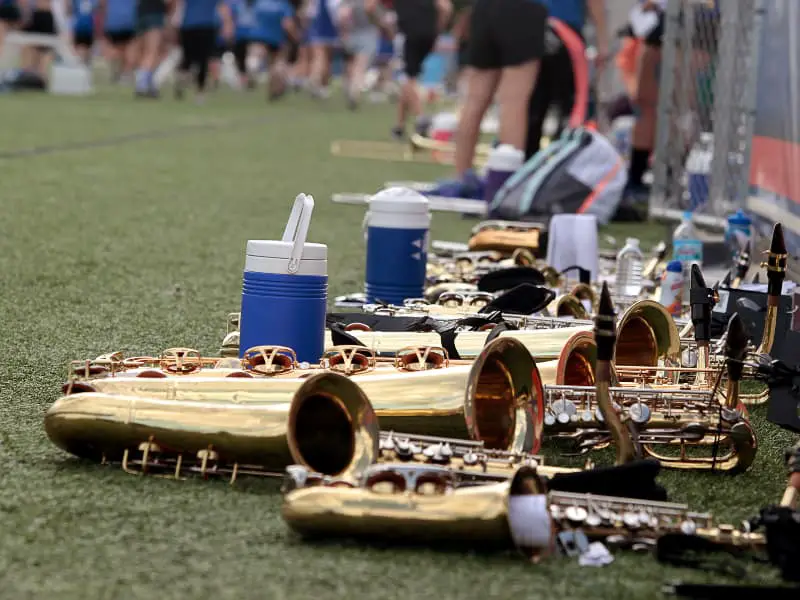
Lunch: 12:00 – 12:45 PM
This is the hottest part of the day, so you will eat inside a band room or shaded area to keep cool and remain there for most of the afternoon. It is important to bring adequate food and snacks for lunch to replace nutrients and sugars and restore energy that decreased while outside in the hot sun.
Band Warm Up/ Tuning: 12:45 – 1:00 PM
All bands tune and warm up before playing, marching band does the same.
Full Band Rehearsal: 1:00 – 2:30 (or 2:45) PM
During this rehearsal time, you will work on the music for the season. Stands tunes will be worked on here as well. All the music you receive should go straight into the pages of your flipbook.
Sectionals: 2:30/2:45 – 3:30 PM
The band will break up into sectionals led by either a member of the band’s staff or a senior/section leader. This is when you will work on complex parts of the show music together and practice as a single section. Some student leaders take these sectionals very seriously. Others will be a bit more relaxed, regardless of the style; your director will walk around and call your section out if you are talking more than playing.
Outside for Drill: 3:30 – 6:00 PM
Now that the sun isn’t as intense, you will likely return to the field or lot and start learning drill and how to read a drill book. Drill is the formation on the field a marching band makes. Most marching band practices during the week will consist of playing while executing and learning more drill/cleaning up the drill.
🎵 Note: If it is storming, raining too much to return outside, or the field is flooded from the rain while the band is inside, your director will have another full band rehearsal instead.
You will be standing during all full band rehearsals, and you may be asked to mark time while playing.
Marking time is like tapping your foot to stay on tempo in a concert band. What is different is you will trudge (lift one heel up while the other foot is flat on the ground) instead. The goal is to return to the field, but the weather may have other ideas.
Leave: 6:00 PM
Your day is over. If you cannot drive, one of your parents will take you home for the rest of the evening, and you will return in the morning.
We hope this article has been helpful and informative for you in your musical journey. Please let us know if there is anything that we could add or change to make this article a better resource for our readers.
Please e-mail us at: [email protected] to let us know how we are doing!
Disclaimer: This post may contain affiliate links. We only recommend high-quality products that are used and recommended by real musicians. If you use these links to buy something we earn a small commission.
